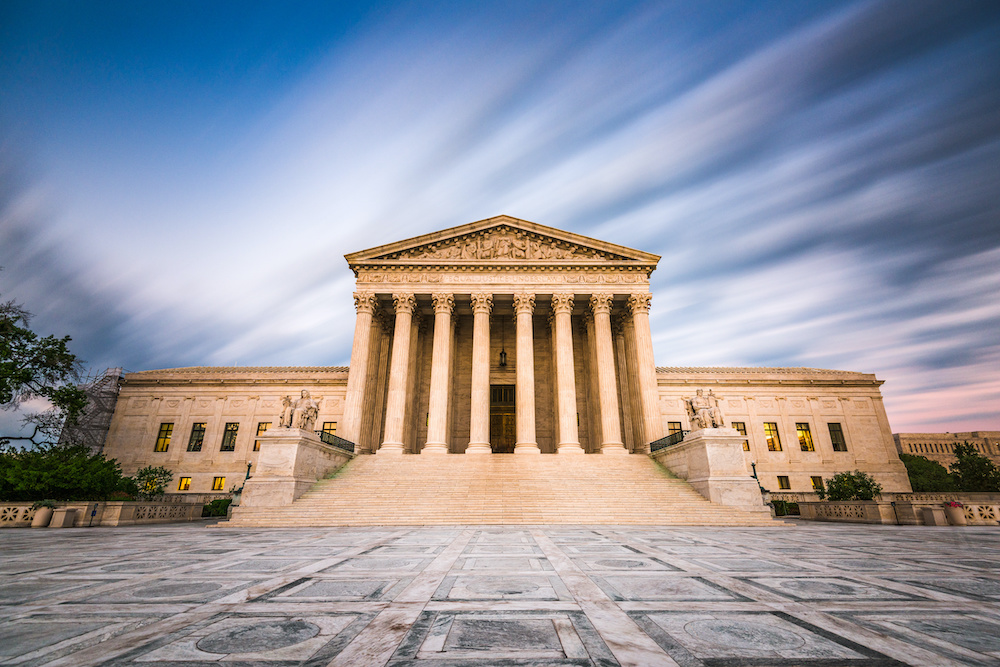
- Details
- By Native News Online Staff
The Mandan, Hidatsa, and Arikara (MHA) Nation, along with Native voters Cesar Alvarez and Lisa Deville, have submitted an amicus brief in defense of Section 2 of the Voting Rights Act (VRA) during the U.S. Supreme Court's review of Louisiana v. Callais (consolidated with Robinson v. Callais). This case challenges a fair district map enacted by the Louisiana legislature after Black Louisianans demonstrated that the previous redistricting map unlawfully diluted Black votes. The Native voters and the MHA Nation aim to uphold federal laws that protect voters from gerrymandering and ensure fair democratic elections in the United States.
The MHA Nation and Native voters are experienced in such litigation, having previously defended the creation of a North Dakota legislative subdistrict in Walen v. Burgum. Under Section 2 of the VRA, lawmakers must consider and respect political boundaries—such as Tribal Nation reservation boundaries—when drawing district lines to ensure that communities within those boundaries have a fair opportunity to elect representatives of their choice. To comply with Section 2, the North Dakota Legislature established House District 4A, a subdistrict aligned with the MHA Nation’s reservation boundaries, enabling MHA voters to elect their candidate of choice.
The Walen v. Burgum lawsuit sought to dismantle District 4A. However, the Native voters and the MHA Nation successfully defended it, alongside the state of North Dakota, in district court. Despite this victory, the legal status of the subdistrict is now before the U.S. Supreme Court. In a surprising turn, the North Dakota Attorney General has requested the Court overturn the district court decision that upheld the creation of the MHA subdistrict.
“Like the Black voters advocating for a fair election map in Louisiana, Native voters in North Dakota have also had to file lawsuit after lawsuit to vindicate their right to vote. For many Americans, this unending civil rights struggle requires fighting in the courts for legal redistricting maps that allow their votes to count,” said Native American Rights Fund Staff Attorney Lenny Powell.
In their Callais amicus brief, the Mandan, Hidatsa, and Arikara (MHA) Nation and Native voters, represented by the Native American Rights Fund (NARF) and the Campaign Legal Center, urge the Court to reverse the district court's ruling that Louisiana’s current congressional map constitutes an unconstitutional racial gerrymander. The brief highlights that the U.S. Supreme Court previously rejected similar arguments made by elected officials in the 2023 decision of Allen v. Milligan. Additionally, the MHA Nation and Native voters counter mischaracterizations presented in an amicus brief filed by 12 states in the Callais case. That brief attempts to distort both the legal victory achieved by Native voters in Walen v. Burgum and the fundamental purpose of Section 2 of the Voting Rights Act.
“This case is an attempt to strip Black voters in Louisiana of their right to equal representation. When a minority group is continually denied the opportunity to elect its chosen candidates, then our democracy cannot be said to be truly inclusive of all voters regardless of race or ethnicity. The Supreme Court should reject this attempt to undermine the protections of the Voting Rights Act and allow to stand the map adopted by Louisiana to provide fair representation to Black voters while maintaining other important state goals,” said CLC Senior Vice President Bruce Spiva.
More Stories Like This
Native News Weekly (August 25, 2024): D.C. BriefsUS Presidents in Their Own Words Concerning American Indians
Indigenous Actor Elaine Miles Reports Detention by Alleged ICE Agents
Happy Thanksgiving from Native News Online
Coming Up on Native Bidaské: Behind the Animation: Joey Clift Talks “Pow” and Native Storytelling
Help us tell the stories that could save Native languages and food traditions
At a critical moment for Indian Country, Native News Online is embarking on our most ambitious reporting project yet: "Cultivating Culture," a three-year investigation into two forces shaping Native community survival—food sovereignty and language revitalization.
The devastating impact of COVID-19 accelerated the loss of Native elders and with them, irreplaceable cultural knowledge. Yet across tribal communities, innovative leaders are fighting back, reclaiming traditional food systems and breathing new life into Native languages. These aren't just cultural preservation efforts—they're powerful pathways to community health, healing, and resilience.
Our dedicated reporting team will spend three years documenting these stories through on-the-ground reporting in 18 tribal communities, producing over 200 in-depth stories, 18 podcast episodes, and multimedia content that amplifies Indigenous voices. We'll show policymakers, funders, and allies how cultural restoration directly impacts physical and mental wellness while celebrating successful models of sovereignty and self-determination.
This isn't corporate media parachuting into Indian Country for a quick story. This is sustained, relationship-based journalism by Native reporters who understand these communities. It's "Warrior Journalism"—fearless reporting that serves the 5.5 million readers who depend on us for news that mainstream media often ignores.
We need your help right now. While we've secured partial funding, we're still $450,000 short of our three-year budget. Our immediate goal is $25,000 this month to keep this critical work moving forward—funding reporter salaries, travel to remote communities, photography, and the deep reporting these stories deserve.
Every dollar directly supports Indigenous journalists telling Indigenous stories. Whether it's $5 or $50, your contribution ensures these vital narratives of resilience, innovation, and hope don't disappear into silence.
 The stakes couldn't be higher. Native languages are being lost at an alarming rate. Food insecurity plagues many tribal communities. But solutions are emerging, and these stories need to be told.
The stakes couldn't be higher. Native languages are being lost at an alarming rate. Food insecurity plagues many tribal communities. But solutions are emerging, and these stories need to be told.
Support independent Native journalism. Fund the stories that matter.
Levi Rickert (Potawatomi), Editor & Publisher

